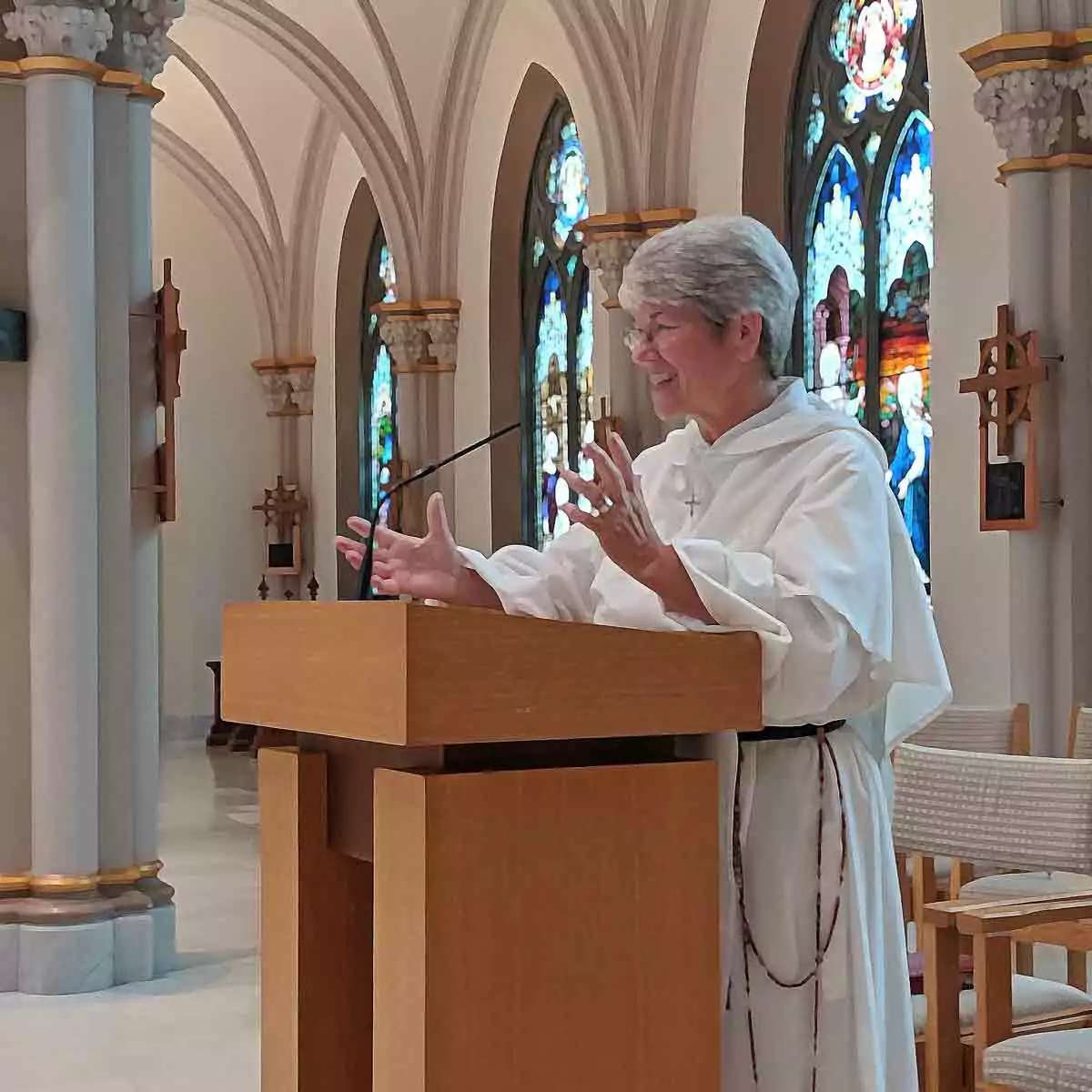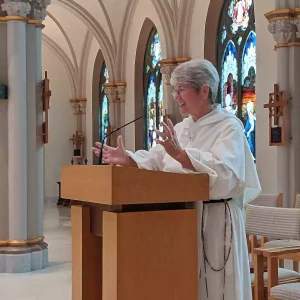
by Megan McElroy OP
 Living and Praying Liturgy Well
Living and Praying Liturgy Well
For 11 July 2022, Monday of week 15 in Ordinary Time, based on Isaiah 1:10-17
theWord daily homilies from the Order of Preachers
This preaching can also be listened to and shared from this website. https://word.op.org/2022/07/11/27714/
HOMILY: Monday of the 15th Week of Ordinary Time
Scripture: Isaiah 1:10-17
July 11, 2022
Title: Living and Praying Liturgy Well
Reading 1
Hear the word of the LORD,
princes of Sodom!
Listen to the instruction of our God,
people of Gomorrah!
11What care I for the number of your sacrifices?
says the LORD.
I have had enough of whole-burnt rams
and fat of fatlings;
In the blood of calves, lambs and goats
I find no pleasure.
12When you come in to visit me,
who asks these things of you?
13Trample my courts no more!
Bring no more worthless offerings;
your incense is loathsome to me.
New moon and sabbath, calling of assemblies,
octaves with wickedness: these I cannot bear.
14Your new moons and festivals I detest;
they weigh me down, I tire of the load.
15When you spread out your hands,
I close my eyes to you;
Though you pray the more,
I will not listen.
Your hands are full of blood!
16Wash yourselves clean!
Put away your misdeeds from before my eyes;
cease doing evil; 17 learn to do good.
Make justice your aim: redress the wronged,
hear the orphan’s plea, defend the widow.
I can remember as a child my parents coming up to our bedrooms when we kids were acting up and saying, “What is all this commotion about?” Usually, we were fighting over something and neglecting what we were supposed to be doing (probably cleaning our rooms). We’d get a tongue-lashing and hear, “Knock it off and get to work!”
In today’s first reading, God sounds just like my parents: The kids are acting up: the sacrifices of worship are meaningless, worthless offerings. “When you come into visit me, who asks you to do these things?” Speaking for God when confronting the people’s worship, it’s like the prophet is saying, “What are you doing? What’s all this commotion about?” God goes on with quite a tongue-lashing, “Trample my courts no more! Your new moons and festivals I detest! They weigh me down; I tire of the load. I will not listen to your prayers any longer!” And then, the Lord continues, “Put away your misdeeds from before my eyes. Cease doing evil. Learn to do good. Make justice your aim.” In other words, “Knock it off and get to work!”
In his recent and beautiful apostolic letter on the liturgy, Dizz-a-derio Desi-dare-avi (forgive my Latin pronunciation,) Pope Francis challenges us today in our own celebrations of worship and thanksgiving, particularly in the Eucharist. Sadly, we’ve come to a place in our communion that pits us one against the other – whose style of worship is better, who’s worthy to come to the table or not, what does it mean to be a Eucharistic people? Such divisions in what is our Source and Summit of life do nothing to be the witness we’re called to be as disciples of Jesus Christ. Francis writes, echoing the prophet’s tone, “I want the beauty of the Christian celebration and its necessary consequences for the life of the Church not to be spoiled by a superficial and foreshortened understanding of its value or, worse yet, by its being exploited in service of some ideological vision, no matter what the hue. The prayer of Jesus at the Last Supper that all may be one (Jn 17:21) judges every one of our divisions around the Bread broken, around the sacrament of mercy, the sign of unity, the bond of charity” (#16).
That’s the tongue-lashing we need that we remember what Eucharist is about. Francis reminds us that when we get caught in such minutiae of details and particular understandings and interpretations, we are missing the whole point of Eucharist. The Eucharist is profoundly and simply a gift for which we are not worthy and yet it is the desire of Jesus that we receive it, that we receive him, so that we might encounter him in the flesh. Francis writes of the Last Supper, “No one had earned a place at that Supper. All had been invited. Or better said: all had been drawn there by the burning desire that Jesus had to eat that Passover with them.”
Francis continues encouraging us in our celebrations today, “The world still does not know it, but everyone is invited to the supper of the wedding of the Lamb. To be admitted to the feast all that is required is the wedding garment of faith which comes from hearing of his Word (para 5)….Let us abandon our polemics to listen together to what the Spirit is saying to the Church. Let us safeguard our communion. Let us continue to be astonished at the beauty of the Liturgy. The Paschal Mystery has been given to us. Let us allow ourselves to be embraced by the desire that the Lord continues to have to eat His Passover with us.”
The great Jesuit theologian, Karl Rahner spoke of the liturgy of the world, that what happens in the Eucharist is to then be broken and shared in the world. We who have been gifted with the very life of Jesus Christ and have taken him into our bodies then become the Body of Christ. We are to freely give of ourselves as Jesus gave (and continues to give) of himself. In other words, we are to put into action the life of Jesus – a life of love and justice, truth and reconciliation, compassion and service. We are to be Christ in the world. We are to conform our lives to Jesus so that as St. Paul says, “It is no longer I who lives but Christ who lives in me.” Pope Francis puts it thus, “The full extent of our formation is our conformation to Christ. I repeat: it does not have to do with an abstract mental process, but with becoming Him. This is the purpose for which the Spirit is given, whose action is always and only to confect the Body of Christ. It is that way with the Eucharistic bread, and with every one of the baptized called to become always more and more that which was received as a gift in Baptism; namely, being a member of the Body of Christ. Leo the Great writes, “Our participation in the Body and Blood of Christ has no other end than to make us become that which we eat.” [11] (para 41)
The challenge is great. We are called to look ourselves in the face and acknowledge how we need to be transformed again and again into the Body of Christ, to let go of our particular preferences, to stop the commotion, and allow the grace of Jesus Christ to shower upon us that we may become whom we receive and then get to work, making justice our aim.

